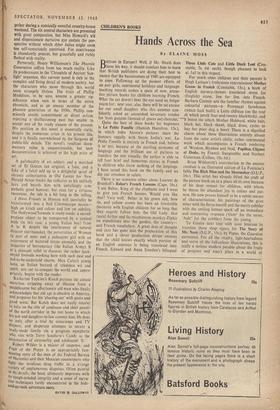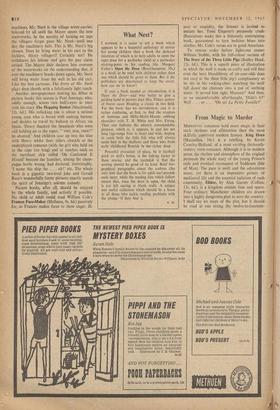CHILDREN'S BOOKS
Hands Across the Sea
By ELAINE MOSS
BRITAIN in Europe? Well, if Mr. Heath does have his way, it should comfort him to learn that British publishers are doing their best to ensure that the businessmen of 1980 are equipped to cope. Following up the pioneer efforts of au pair girls, continental holidays and language- teaching records comes a spate of new, attrac- tive picture books for children learning French. What the ear doesn't hear the eye need no longer yearn for : next year-alas, there will be no excuse for our small daughter who this summer con- fidently asked an astonished ice-cream vendor for `trois garcons (instead of glaces au] chocolat.'
Quite the best of these books for beginners is La Petite Famille (Hamish Hamilton, I5s.), in which John Alcorn's pictures share the honours equally with Sesyle Joslin's text. La Petite Famille is entirely in French and, believe it or not, because of the startling economy of language and the brilliant use of pictures to translate the text visually, the author is able to tell four brief and humorous stories in French to children who know nothing of the language. I have tested this book on the family and we dip our tricolore in salute.
There is no nonsense either about Laurent de Brunhoff's Babar's French Lessons (Cape, 16s.). 'I am Babar, King of the elephants and I want to give you French lessons. Would you like that? Very well.' Babar in his green suit, bow tie, and -yellow crown has been an irresistible favourite with English children for so long that they eagerly follow him, the Old Lady, that rascal Arthur and the mischievous monkey Zdphir on expeditions into the garden, the country— and French vocabulary. A great deal of thought and care has gone into the preparation of this book and a clever production device ensures that the child knows exactly which portion of an English sentence is being translated into French. Edward and Anna Standon's bilingual Three Little Cats and Little Duck Lost (Con- stable, 7s. 6d. each), though pleasant to look at, fail in this respect.
For much older children and their parents is Hugh Latham's frolicsome entertainment Mother Goose in French (Constable, 15s.), a book of English nursery-rhymes translated stress for (English) stress, line for line, into French. Barbara Cooney sets the familiar rhymes against colourful pictures—a Provençal farmhouse (which Jack built), a Loire chateau (on the roof of which perch four-and-twenty blackbirds). and
••-li bistro (to which Mother Hubbard, white hair, black hat, black shawl, black dress, cycles to buy her poor dog a beer). There is a dignified charm about these illustrations entirely absent from the same artist's chilly, rather sentimental work which accompanies a French rendering of `Wynken, Blynken and Nod,' Papillot, Clignot et Dodo, by Francis Steegmuller and Norbert Guterman (Collins, 10s. 6d.).
Brian Wildsmith's contribution to the entente cordiale is an illustrated edition of La Fontaine's fable The Rich Man and the Shoemaker (O.U.P., 16s.). This artist has already lifted the craft of the picture book on to a plane all its own because of his deep respect for children, with whom he shares his abundant joy in colour and pat- tern. He now proves himself to be a subtle master of characterisation: his paintings of the grim miser with the fierce mastiff and the merry cobbler with the smiling kittens spark off an immediate and contrasting response ('Ooh!' for the miser, `Aahr for the cobbler) from the young.
To Greece next (out with your lexicons to translate those shop signs), for The Story of Mr. Nero (O.U.P., 15s.), by Papas, the Guardian cartoonist. For all the vitality, light-heartedness and verve of the full-colour illustrations, this is really a serious modern parable about the fruits of progress and man's place in a world of
machines, Mr. Nerd is the village water-carrier, beloved by all until the Mayor opens the new waterworks. In the novelty of turning on taps the villagers forget poor Mr. Nerd—until one day the machinery fails. This is Mr. Ner6's big chance. Does he bring water in his cart to the feckless, thirsty villagers? Certainly not! He withdraws his labour and gets his pay claim settled. The Mayor duly declares him overseer of the waterworks on the understanding that, if ever the machinery breaks down again, Mr. Ner6 will bring water from the well in his old cart. Like the best cartoons, The Story of Mr. Nero plays deep chords with a felicitously light touch.
Another newspaperman making his debut in picture books this season is Paul Jennings, who, oddly enough, scores two bull's-eyes at once with his story The Hopping Basket (Macdonald, 12s. 6d.). His rollicking tale is about a serious young man who is bored with making buttons and decides to travel by balloon to Africa via Spain. 'Henry thanked the Spaniards who were still holding on to the ropes. "'UNO, Dos, TRES ! " he shouted.' And children soar up into the blue with Henry whilst their elders chuckle at the underplayed romance (with the girl who held on to the rope too long) and at touches such as the merchant ship called 'Oh Confound It Missed' because the launcher, aiming the cham- pagne bottle wrong, had declared, irretrievably, '.1 name this ship the . . . oh!' etc. The whole book is a gigantic two-level joke and Gerald Rose's wonderfully funny pictures exactly match the spirit of Jennings's solemn comedy.
Picture books, after all, should be enjoyed by the whole family, and actively if possible. No child or adult could read William Cole's Frances Face-Maker (Methuen, 9s. 6d.) passively for, as Frances makes faces to show anger, ill-
ness or stupidity, the listener is invited to imitate her. Tomi Ungerer's purposely crude illustrations make this a hideously entertaining book, guaranteed to turn bedtime blues into stitches. Mr. Cole's verses are in good American.
To restore order before lights-out comes William Stobbs, with his full-colour version of The Story of the Three Little Pigs (Bodley Head,, 12s. 6d.). This is a superb piece of illustration in which the wolf is made so crafty and evil that even the least bloodthirsty of six-year-olds does not carp at the third little pig's complacency as he sits in his rocking-chair watching the wolf fall down' the chimney into a pot of seething water. 'It served him right, Mummy!' And then, as an uncomfortable afterthought, 'Didn't it?' Well . . . er . . . 'Oil est La Petite &ulnae?'















































 Previous page
Previous page